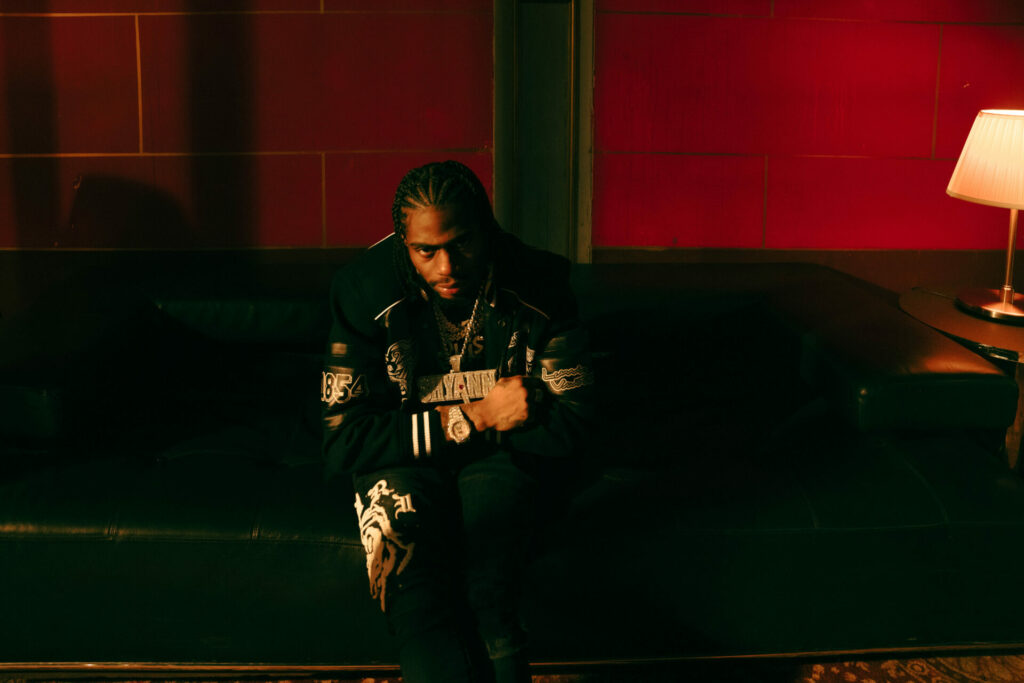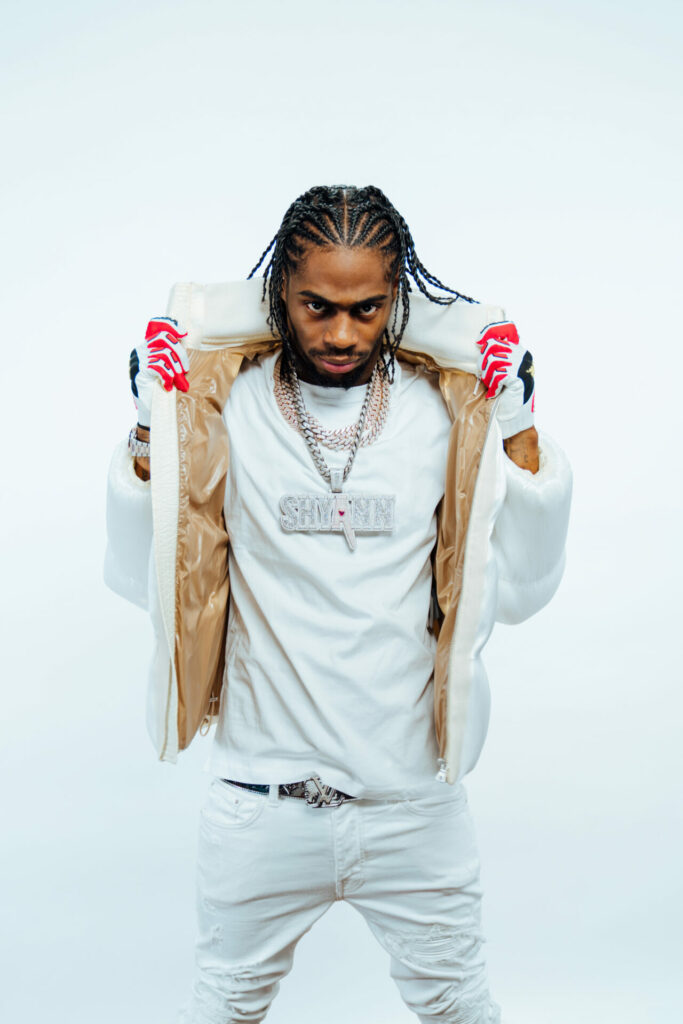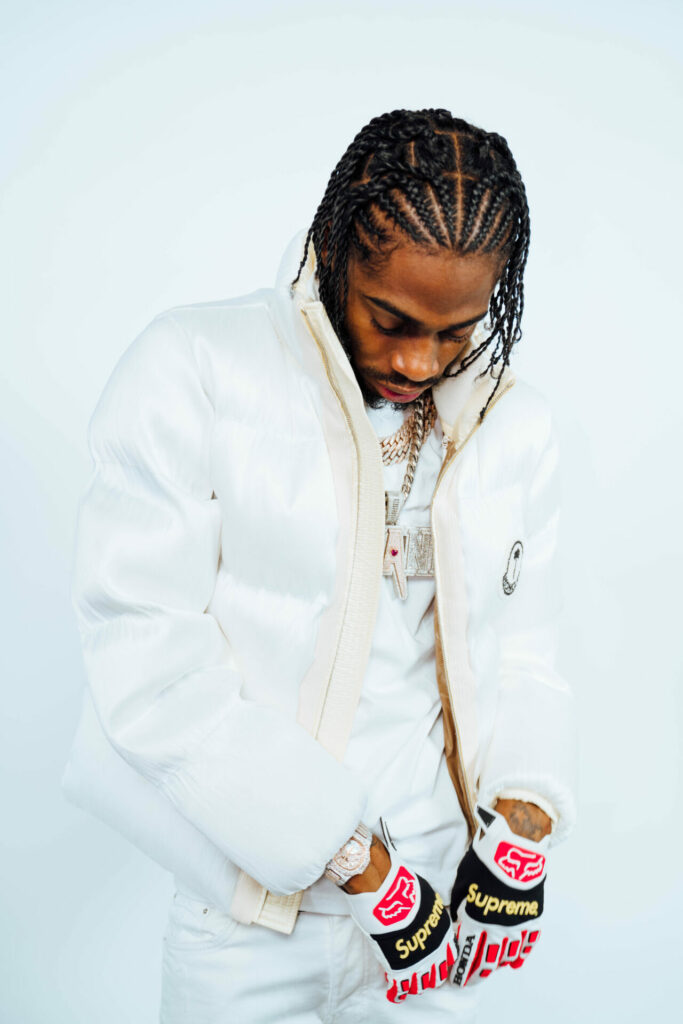Russ Millions on ‘One Of A Kind’: ‘I want to take my fans on a journey’
Russ Millions is commercial drill personified. As he releases new mixtape 'One of a Kind,' the first artist from the genre to have a number-one hit contemplates his art and his ongoing desire to make fans want to move

Drill is as far-reaching as it’s ever been. From the soul-infused, tenderly constructed ‘You Lose’ by Shae Universe (2020) to the matter-of-fact poignance that anchors last year’s ‘Plenty’ by V9, via cocksure and trap-infused collaborative efforts like Yung Bleu’s ‘One of Those Nights’, the globally driven music genre — developed in both North America and the UK — boasts multiple entry points in its short existence. For UK-based rapper Russ Millions, his contribution to the art form is one of movement.
“If you’re not someone who moves, my music just isn’t for you,” he asserts with a laugh. It’s near zero degrees when we meet on a winter’s evening, but Millions — real name Shylo Batchelor Ashby Milwood — is warm and assured in one of the first utterances of our exchange. “That’s just what I prefer, that’s what I’m about, not that dark sh*t,” he says.
Outside of affirmations about his music lies the 26-year-old’s lineage and tastes as a child. Ethnically Jamaican, Millions’ history is one of rich cultural outputs. “Jamaica To Di World” is a saying that permeates the island’s culture both on and off it — a maxim reaffirmed by Usain Bolt in celebration of the country’s 60th anniversary of independence last year. It’s a statement that reinforces the country’s influence on the western and wider world. It was this cultural currency that led to Millions’ passion for dancing in his youth, eventually gravitating towards Jamaica’s prominent dancehall figures.
“Do you know who Bogle is?” he asks me. Revelling in our shared knowledge of the regional icon, Millions divulges his reverence for the dancer and choreographer. “I used to watch him on YouTube, I used to think that that was lit, that’s how it is.” Inspiring even the likes of Rihanna (in her ‘Rude Boy’ visual), Bogle was prominent in gaining the respect of dancehall artists like Elephant and Beenie Man. Dancehall at large — and dances like Willie Bounce, Bad Man Forward and Gully Creeper — was another of Millions’ early introductions to dance as an art form and an entry point to music. “[Popcaan], Vybz, Aidonia, Tommy Lee, I was on my Gaza thing,” he laughs, referencing a fundamental period of division involving two Jamaican behemoths — Vybz Kartel and Mavado — as Gaza and Gully rivalry saw division between the two forces and the micro-communities at large.
On a personal level, Millions has been a driving force in bringing this element to UK drill, adding to a continually emerging culture within the genre. Its global fluidity — by way of UK producers working with those in New York (via Brooklyn) — has seen aggressive British snares and high hats merge with a party-infused US style from the likes of Fivio Foreign and Ron Suno.

After years of experimentation, the Lewisham-based lyricist added the instantly infectious ‘Gun Lean’ to his repertoire, as well as British dancefloors. Including all the ingredients of a viral dance — ease, fluidity and flair — the light-hearted, audacious single notched up millions of views within weeks of its December 2018 release. “I love what that song did, I was so hungry for more,” he reflects. “It was good collaborating with people you didn’t think you’d be standing beside at one point. People always see your thing, mock it, but you never know when it’s your time.”
He wouldn’t have to wait long to ascend further into the upper echelons of drill and UK rap, doubling down on his chart-topping abilities in music. Four months after the release of the original, Millions’ and Tion Wayne’s remixed ‘Keisha & Becky’ eventually peaked at number seven on the UK Singles Chart in April 2019 — two positions higher than its previous incarnation. Millions’ most successful singles — including the first drill number one ‘Body’ — have followed a blueprint of simple lyricism, stylistically simple ominous tracks by producer Gotcha and lots of infectious, natural charisma and movement while orbiting commercial drill. However, in 2023, Millions is eager to evolve.
“I do want to go away soon and work on my craft,” he says of his plans for the year. He pauses, and the laughter present at the beginning of our call quickly evaporates, with Millions the most blanketed he’s been during our chat. “I have a lot more to do, I have a lot more to give. I want even more number ones. It’s time to find a little bunker and work on myself,” he says.
Having risen to fame over the past few years, earning his place at rap’s table, Millions loves the idea of presenting personal stories and a lyricism in his art, but struggles with the idea of introducing other writers as a part of his development. Rationalising his initial thoughts, he ponders the prospect of others helping on future projects. “I’d still want the stories I tell to be one hundred per cent mine or they aren’t authentic, are they? But someone to help me flesh out those ideas, I could accept those maybe,” he says. Being a sole or majority writer, is something he likens to the early era of rap in the 80s and 90s. Millions, then, is a rap purist when it comes to lyrical prowess.

Another challenge is the inner workings of record labels and the wider music business. “When I make a song, I want to release it today,” he says brazenly. “But obviously, there’s a process, approvals. It can’t just come out today. Part of that means that when things do release, I’m months, sometimes years ahead as an artist.” A case in point is his upcoming mixtape — he’s very particular about labelling it as that — One of a Kind. “It’s as simple as the name,” he says. “I am that — it’s my time.” Boasting 17 songs, as of when we spoke in December, the project had been a year and a quarter in the making and its release, on 24 February, is a pushback from initial January plans.
Toying with his cadence across a plethora of the songs, Millions has also stepped out of his frequent use of Gotcha soundscapes, opting to work with producer Jaygo Beats, who he recently signed to his One of a Kind music imprint. “When I hear a fire production, something that drives something in me, something I can believe, I can instantly write. That’s why I signed him. I haven’t even met him, but he had a promise I saw,” he says of Jaygo, highlighting how he envisages a “long” future of collaboration.
Thematically, One of a Kind is much of the same, centred on romance, infatuation with the opposite sex and an abundance of self-confidence. It invites listeners into the realm of Millions’ area of drill’s now expansive ecosystem, allowing audiences to play and indulge with him. The collection also spotlights his societal and identity-based thinking with stand-out production ‘Shorty’ that spotlights women in rap — specifically Ms Banks, Ivorian Doll and TeeZandos — and was crafted to address the gender imbalance in drill. “I just wanted to do something cool that featured some of the women in my [genre]. There’s clearly less of them out there,” he says. In a 2020 interview, Ivorian Doll mentioned her segue into the sound and men not taking women seriously. Millions sees the issue of women not existing in the same volume and with the same visibility as one that’s due to the nature of the genre’s origin. “Drill has a dark and aggressive past, that’s probably why the men get more attention… it started more from us, naturally if there’s more of it, it’s going to lean to the [male] side more,” Millions elaborates.
In broader culture, drill has faced a continuous onslaught of public scrutiny. From politicians to members of the public on both sides of the Atlantic, the genre is subject to both vilification and criminalisation. From Rolling Loud festival instantly removing drill acts from their line-ups last year, to the evolving use of drill lyrics in courtrooms, Millions is fully aware of the tension. Ruminating on the violent lyricism in subpockets of the genre, he eventually likens it to film and TV, while growing concerned about the prejudice and double standard. “It’s not fair, if I ever went to court for my lyrics, [I’d argue] that they’d have to take some movies down as well,” he says. “I’m seeing firearms, stabbings and knives. That’s inciting violence, too.” He then thoughtfully adds, “If there was a court of world opinions, we’d be able to see all of these contradictions.”
Drill, however, isn’t all Russ is tied down to. He’s excited when I mention his vault of tracks. “I’ve made genres of songs, I’ve made so many different sides of music,” he says, adding how he’s most keen to showcase his dancehall song, which he’s still not ready to share with the world. “I might work on those types of songs more. But I need to release singles outside of album campaigns to see if they fit where I’m going, but I want to still make people dance too.”
His first priority, however, is One of a Kind. “I want to take my fans on a journey with me; I want a legacy. If I’m going to be here for a long time, it’s about the long game.”
